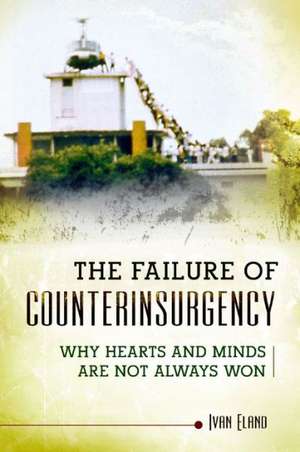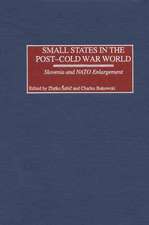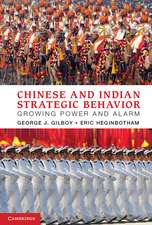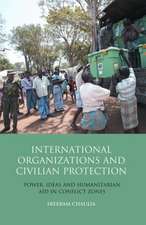The Failure of Counterinsurgency: Why Hearts and Minds Are Seldom Won: Praeger Security International
Autor Ivan Elanden Limba Engleză Hardback – 18 iul 2013 – vârsta până la 17 ani
Din seria Praeger Security International
- 18%
 Preț: 334.19 lei
Preț: 334.19 lei - 8%
 Preț: 335.53 lei
Preț: 335.53 lei - 34%
 Preț: 376.10 lei
Preț: 376.10 lei - 46%
 Preț: 443.64 lei
Preț: 443.64 lei - 8%
 Preț: 304.56 lei
Preț: 304.56 lei - 34%
 Preț: 373.82 lei
Preț: 373.82 lei - 19%
 Preț: 412.79 lei
Preț: 412.79 lei - 19%
 Preț: 338.42 lei
Preț: 338.42 lei - 18%
 Preț: 335.62 lei
Preț: 335.62 lei - 27%
 Preț: 377.35 lei
Preț: 377.35 lei - 27%
 Preț: 376.75 lei
Preț: 376.75 lei - 18%
 Preț: 336.46 lei
Preț: 336.46 lei - 18%
 Preț: 321.73 lei
Preț: 321.73 lei - 27%
 Preț: 384.51 lei
Preț: 384.51 lei - 18%
 Preț: 320.50 lei
Preț: 320.50 lei - 18%
 Preț: 320.50 lei
Preț: 320.50 lei - 18%
 Preț: 321.35 lei
Preț: 321.35 lei - 24%
 Preț: 420.54 lei
Preț: 420.54 lei - 14%
 Preț: 335.99 lei
Preț: 335.99 lei - 18%
 Preț: 355.82 lei
Preț: 355.82 lei - 18%
 Preț: 319.83 lei
Preț: 319.83 lei - 18%
 Preț: 334.28 lei
Preț: 334.28 lei - 32%
 Preț: 354.48 lei
Preț: 354.48 lei - 14%
 Preț: 335.14 lei
Preț: 335.14 lei - 38%
 Preț: 405.98 lei
Preț: 405.98 lei - 40%
 Preț: 571.34 lei
Preț: 571.34 lei - 18%
 Preț: 321.85 lei
Preț: 321.85 lei - 18%
 Preț: 323.25 lei
Preț: 323.25 lei - 18%
 Preț: 253.28 lei
Preț: 253.28 lei - 40%
 Preț: 571.50 lei
Preț: 571.50 lei - 14%
 Preț: 333.72 lei
Preț: 333.72 lei - 18%
 Preț: 301.73 lei
Preț: 301.73 lei - 19%
 Preț: 352.96 lei
Preț: 352.96 lei - 26%
 Preț: 387.80 lei
Preț: 387.80 lei - 18%
 Preț: 302.77 lei
Preț: 302.77 lei - 14%
 Preț: 333.91 lei
Preț: 333.91 lei - 17%
 Preț: 325.80 lei
Preț: 325.80 lei - 24%
 Preț: 338.58 lei
Preț: 338.58 lei - 34%
 Preț: 414.73 lei
Preț: 414.73 lei - 18%
 Preț: 354.30 lei
Preț: 354.30 lei - 29%
 Preț: 254.29 lei
Preț: 254.29 lei - 18%
 Preț: 354.11 lei
Preț: 354.11 lei - 18%
 Preț: 334.38 lei
Preț: 334.38 lei - 14%
 Preț: 302.68 lei
Preț: 302.68 lei - 18%
 Preț: 322.97 lei
Preț: 322.97 lei - 27%
 Preț: 376.50 lei
Preț: 376.50 lei - 27%
 Preț: 322.81 lei
Preț: 322.81 lei - 27%
 Preț: 382.91 lei
Preț: 382.91 lei - 18%
 Preț: 320.87 lei
Preț: 320.87 lei
Preț: 240.11 lei
Preț vechi: 339.95 lei
-29% Nou
Puncte Express: 360
Preț estimativ în valută:
45.94€ • 47.97$ • 38.03£
45.94€ • 47.97$ • 38.03£
Carte disponibilă
Livrare economică 15-29 martie
Preluare comenzi: 021 569.72.76
Specificații
ISBN-13: 9781440830099
ISBN-10: 1440830096
Pagini: 200
Ilustrații: 40
Dimensiuni: 156 x 235 x 20 mm
Greutate: 0.48 kg
Editura: Bloomsbury Publishing
Colecția Praeger
Seria Praeger Security International
Locul publicării:New York, United States
ISBN-10: 1440830096
Pagini: 200
Ilustrații: 40
Dimensiuni: 156 x 235 x 20 mm
Greutate: 0.48 kg
Editura: Bloomsbury Publishing
Colecția Praeger
Seria Praeger Security International
Locul publicării:New York, United States
Caracteristici
Covers major instances of COIN warfare in history, including the French in Algeria and Indochina, the British in Malaysia and Afghanistan, the United States in Vietnam and the current wars in Iraq and Afghanistan, and numerous others
Notă biografică
Ivan Eland, PhD, is director of the Center on Peace and Liberty at The Independent Institute in Oakland, CA. His published works include Praeger's Putting Defense Back into U.S. Defense Policy: Rethinking U.S. Security in the Post-Cold War World.
Cuprins
1 Introduction: Quagmire: The Usual Outcome of Counterinsurgency WarfareWhat Is an Insurgency?Guerrillas Have the Advantage in COIN WarsGuerrillas Not Winning the Support of the People Is RareGovernments Disregard History and Continue to Jump into COIN Wars2 When to Battle InsurgentsThe Different Types of Guerrilla WarsLosing COIN Both Militarily and PoliticallyWinning COIN Militarily, but Losing PoliticallyLosing COIN Militarily, but Winning a Larger ConflictCOIN War Ending in Negotiated Settlement or Concessions by COIN ForcesClosely Examining the Minority of Cases in which COIN Forces Won Both Militarily and PoliticallyConclusion3 Classic COIN StrategyScorched Earth Sometimes SucceedsIn the Modern World, a Classical COIN Strategy Is Probably BestBut COIN Doesn't Always WorkInsurgency More Cost Effective Than CounterinsurgencyA Classic COIN Strategy Requires More Forces Than Does Blasting RebelsConclusion4 COIN and CompromiseSuccessful Episodes Involving Concessions or CompromiseMissed OpportunitiesConclusion5 The Disadvantage of Foreign OccupiersA Nationalist Reaction Against Foreign Occupation Can Make Revolt PotentNationalist-Based Insurgencies Are the Most EffectiveEven Factionalized Nationalist Movements Can Win a Guerrilla WarGovernments Can Occasionally Hold the Nationalist Card Vis-à-Vis GuerrillasBut It Doesn't Always Take Nationalist Movements to Win Guerrilla WarsGuerrillas Have Advantages in Propaganda UseForeign Occupiers Are Rarely Given the Benefit of the Doubt by Locals. And Some Local Guerrillas Can (Literally) Get Away with MurderForeign Occupiers Are Handicapped by Poor Knowledge of Local ConditionsIf Foreign Forces Are Used Instead of Training Local Ones, Winning Is ProblematicalThe Advantage of Local Forces Compared to an OutsiderConclusion6 The Guerrilla AdvantageDespite Advances in Technology, Guerrillas Retain AdvantagesGuerrillas May Try to Provoke COIN Forces into an OverreactionConclusion7 COIN Forces' Advantages: Firepower, Numbers, and TechnologyCOIN Forces' Use of Excessive Firepower Often BackfiresTargeted Killings of Guerrilla Leaders May Backfire as a COIN StrategyScorched Earth Policies Can Sometimes WorkSometimes Even Benevolent Policies Are Not SuccessfulLack of Political Will Can Be a Problem in COINExpanding Indigenous Forces to Take Over Can Be DifficultCOIN Forces May Develop Tactical Innovations but Still Lose the WarWaging COIN Is a Difficult Balancing ActConclusion8 Time Favors the InsurgentsGuerrillas Are Often in No HurrySome Insurgents Are Still WaitingTrying to Win Too Quickly Can Hurt InsurgentsA Key Center of Gravity Is Public Support for the COIN War at HomeForeign COIN Forces Are Challenged Because Their Time Is Likely FleetingConclusion9 COIN Wars: The Political AspectsLocal Governments Engaged in COIN Likely Already Suffer Legitimacy ProblemsMilitary Organizations' Forte Is Not the Armed Social Work Needed for COINInstituting Democracy Is Often a Façade and Isn't Always a Plus for COIN WarfareThe Results of Even Fair Elections Are Not Always PredictableCOIN Often Unwisely Tries to Strengthen Local Central GovernmentConclusion10 The Guerrilla Win and External SupportGuerrillas Who Won Militarily or Politically Without External AidEven Without External Aid Some Rebels PersevereWalls Can Be Effective in Keeping Out Aid and Fighters, But Not PermanentlyGuerrillas Who Likely Could Have Won Without External AidCould Losers Win With External Assistance?Assisting the EnemyConclusion11 The United States and Politically Dominated WarsPolitics of Weapons Buying Stops Great Powers from Equipping for COINConclusion12 Prospects for Pending COIN WarsU.S. Occupation of IraqU.S. Occupation of AfghanistanCounterinsurgency From the Air: The Drone Wars in Yemen and SomaliaThe General War on TerrorConclusion13 U.S. Track Record on COIN: Implications for Forces and WeaponsU.S. Vital Interests Do Not Usually Require COIN WarfareWhat about the Unlikely Scenario of a Necessary COIN War?Conclusion14 The Domestic Effects of Overseas Counterinsurgency WarsVietnam WarThe War on TerrorConclusionBibliographyIndexAbout the Author













